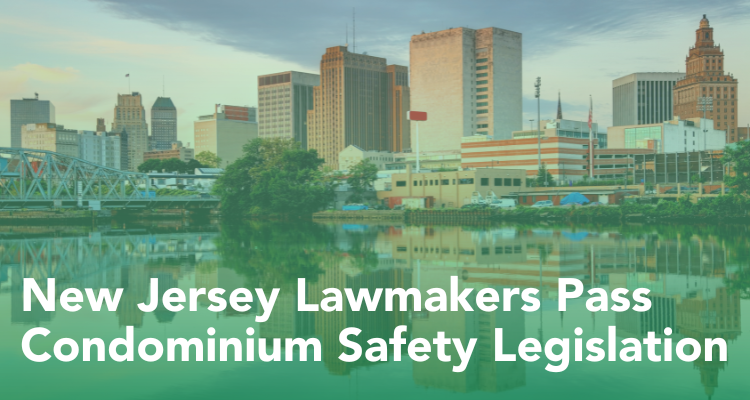On Jan. 8, New Jersey Gov. Phil Murphy (D) signed into law S2760/A4384. The new law, which concerns structural integrity regulations for certain residential buildings, was spearheaded by CAI’s New Jersey Legislative Action Committee (NJ-LAC) over the past two years. This legislation codifies additional procedures for inspecting, evaluating, and maintaining the structural integrity of certain residential housing structures across the state.
This legislation includes a framework largely based on CAI’s Condominium Safety Public Policy Report recommendations. Together, the procedures developed in this legislation will ensure the safety, stability, and resilience of New Jersey’s condominiums and co-ops for generations to come.
This act amends New Jersey’s Uniform Construction Code Act to ensure certain new and existing condominiums and cooperatives are periodically inspected and mandates a structural inspection report be issued as part of the Planned Real Estate Full Disclosure registration process. This legislation also amends the New Jersey Planned Real Estate Act to mandate standards for the periodic completion of capital reserve studies.
In the wake of the June 24, 2021, tragic partial collapse of the Champlain Tower South Condominium in Surfside, Fla., CAI committed itself to making sure such an event never happens again. Following the collapse, New Jersey LAC members and volunteers worked closely with New Jersey state Sens. Troy Singleton (D), Linda Greenstein (D), and Reps. Yvonne Lopez (D) and Benjie Wimberly (D) to lead this multi-year effort to pass this important legislation.
“This week New Jersey has taken a tremendous step toward preventing the human tragedy that occurred in Surfside, Fla., when a residential building collapsed killing 98 residents,” said Ed San George, PCAM, MPA of the NJ LAC. “We worked closely with New Jersey legislators to address building safety and replacement reserve funding on a statewide basis. As buildings age, inevitable deterioration occurs that must be cured. When proper inspections and maintenance of structural components are delayed, costs can be extensive. We thank Gov. Murphy, Sen. Singleton, Sen. Greenstein, Assemblywoman Lopez, and Assemblyman Wimberly for their efforts to create this protective legislation.”
Over the last two years, NJ LAC members led multiple grassroots efforts to raise awareness of condominium safety legislation and promote important public policy to legislators and members of the industry. In September 2022, more than 10 members of the NJ LAC held a CAI Day at the New Jersey Capitol in Trenton to testify for the first time on this legislation. The LAC also used email campaigns and 1,554 CAI advocates sent:
- 7,384 emails to 95 New Jersey assembly members
- 4,117 emails to 47 New Jersey senators
- 182 emails Gov. Murphy
The comprehensive legislation ensures that no matter where a condominium or cooperative is located, it will be periodically inspected and findings will be shared with unit owners, local building officials, and prospective buyers. CAI continues to work with policymakers to make sure associations have time to meet these new requirements, and these new processes are workable for associations, fiscally sound, and physically safe.
A special thanks to the CAI NJ LAC, specifically Edward San George, PCAM, MPA, Mitchell Frumkin, P.E., R.S., and J. David Ramsey, Esq., CCAL, and lobbyist Michele Jaker for leading this effort. They participated in stakeholder meetings and testified before the New Jersey legislature on behalf of the community association industry. We encourage contributions to your state legislative action committee to help fulfill critical advocacy missions and advance condominium safety across the United States. Learn more about how you can contribute to your state’s LAC efforts here.
For more resources, visit www.condosafety.com




Is there a movement towards this being adopted in New York State? If so, do you have a timeframe?